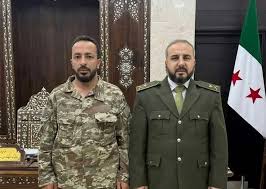In a move that has sent shockwaves across Syria and reopened some of the bloodiest chapters of its civil conflict, the Syrian Army has appointed Ahmad al-Hayes—better known by his nom de guerre Abu Hatam Shaqra—as a brigadier general and commander of the newly formed 86th Division. Hayes, a militia leader long affiliated with Turkish-backed opposition groups, formerly led the notorious faction Ahrar al-Sharqiya.
This controversial promotion comes amid efforts by transitional President Ahmad al-Sharaa to unify disparate armed factions into a cohesive national force. But the decision has sparked outrage, particularly among Syria’s Kurdish communities, who recall with anguish the brutal record of Shaqra and his men in Afrin and other Kurdish-majority regions. The appointment has also alarmed political actors in the east, where the provinces of Deir-ez-Zor, Raqqa, and Hasakah remain under the governance of the Autonomous Administration and the military control of the Syrian Democratic Forces (SDF).
A Symbol of Impunity and Pain
Shaqra’s name is inextricably linked to alleged war crimes and grave human rights violations. His faction, Ahrar al-Sharqiya, was at the forefront of Operation Olive Branch—the 2018 Turkish-led military campaign to seize Afrin from Kurdish control. Numerous rights organizations documented killings, abductions, torture, and widespread looting of civilian property by fighters under his command.
One of the most harrowing incidents associated with Ahrar al-Sharqiya was the murder of Hevrin Khalaf, a prominent Kurdish politician and secretary-general of the Future Syria Party. In October 2019, during the incursion into Ras al-Ayn, images and video clips circulated widely showing Khalaf’s mutilated body after what appeared to be a brutal execution. The crime was widely attributed to Shaqra’s fighters and left a searing mark on Kurdish collective memory. Shaqra has since come to symbolize violence, impunity, and the deep wounds inflicted on Syria’s Kurds.
A Blow to Reconciliation?
The appointment of Abu Hatam Shaqra to a formal military command post is seen by many as a direct threat to the fragile agreement reached in March between President Sharaa and SDF commander Mazloum Abdi. That agreement outlined the gradual integration of the Autonomous Administration’s military and civil institutions into the structure of the Syrian state. Sources close to the SDF say the elevation of Shaqra risks undermining this process, potentially derailing efforts to build trust between Damascus and the Kurds.
Kurdish political actors interpret the appointment as a betrayal of the promises of shared governance and transitional justice. In the absence of accountability or any vetting process, they view Shaqra’s promotion not only as a disregard for their suffering but as a reward for one of the most divisive and violent figures in recent Syrian history.
The decision has exacerbated long-standing mistrust between the Kurdish leadership and the central government. It raises doubts about the feasibility of integrating Kurdish forces into a unified national army and could ultimately jeopardize the broader reconciliation framework painstakingly negotiated over recent months. Some observers warn that the move might bring the region back to a dangerous crossroads, pitting aspirations for stability against the threat of renewed fragmentation.
Repercussions Beyond the Kurds
The implications of Abu Hatam Shaqra’s appointment go beyond Kurdish-Damascus relations. He remains on the U.S. terrorism watchlist for alleged involvement in kidnapping, torture, and extrajudicial killings. His history of expropriating civilian property—particularly in Afrin and Ras al-Ayn—and his current deployment in Syria’s highly sensitive eastern region may complicate counterterrorism efforts and further destabilize the already fragile security landscape.
The broader question remains: why was such a contentious figure elevated at this critical juncture? Is this a calculated power-sharing arrangement with influential armed factions? Or does it reflect a deeper structural flaw in the formation of Syria’s new army—one that prioritizes expediency over justice, and militarism over inclusion?
A Test for Syria’s Transition
As Syria struggles to emerge from over a decade of war, the challenge of building an inclusive and accountable national army looms large. The promotion of Abu Hatam Shaqra may be seen by some as a pragmatic gesture, but for many Syrians—particularly the Kurds—it reopens unhealed wounds and signals a dangerous willingness to sidestep justice in pursuit of military unity.
Rather than closing the chapter on Syria’s painful past, this appointment risks writing new pages of division and distrust. It casts a long shadow over the country’s already precarious political transition and raises urgent questions about the true direction of post-Assad governance in Syria.
This article was translated and edited by The Syrian Observer. The Syrian Observer has not verified the content of this story. Responsibility for the information and views set out in this article lies entirely with the author.


